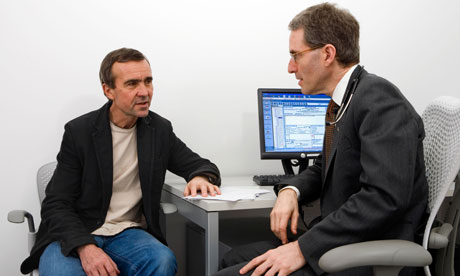
Another health campaign week is upon us. This time it's Men's Health Week.
Unusually this is not a campaign about a condition, rather one targeted towards half the population. But there is a real need for it. We know that men die younger, smoke more, drink more alcohol and ignore symptoms more than women. And many people say to me "So what?". And I reply it is inexcusable in this day and age to die prematurely through ignorance or not feeling like you can access healthcare adequately.
Most men know the score around diet, exercise, alcohol and smoking but can be high-risk individuals when it comes to health, and as a GP I know this all too well. That fear – and I am not sure if it is fear of illness or fear of being judged or both – of the doctor opening up a cornucopia of illnesses when you only popped in because you wanted a quick fix for the bad back you've put up with for six months, is not to be underestimated. And the number of men who attend the GP saying: "I'm only here because the Mrs/my partner/daughter forced me to make an appointment" is as common as rain on a British bank holiday.
Of course in most cultures, men are taught to cope with stuff and just get on with it from an early age. They have not had the same long-term relationship with doctors surgeries as women (smear tests, contraception, antenatal care etc). And there are still no mandatory health checks for men in the NHS. Time too is a factor. We are all so busy these days. Should medical facilities be made available nearer one's workplace to make it easier for men to access healthcare?
The main thing is that as a profession we should try to increase awareness around preventing illness, not just acting on symptoms early. I'm not even sure if general practice is the right setting for promoting health to men. Many men seek health advice on the internet. That's fine as long as what they're consuming is reliable information such as that on the NHS Choices website. But the web is also used to order fake medication, much of which is potentially harmful.
The internet used appropriately is better than not seeking health information, but it just isn't the same as direct face-to-face health advice, promotion and education. I was very happy to hear some schools local to me had welcomed education sessions on testicular cancer awareness as well as offering chlamydia screening to sixth formers with high turnouts. This type of inadvertent positive peer pressure is probably a good thing – anything that raises awareness. And for that to happen, health promotion and feeling able to talk to someone about health issues needs to be made more accessible to men, which could mean through sports and football clubs and the workplace, not just their local surgery.
A sea change is occurring, albeit slowly. For example, the message that erectile dysfunction (ED) can be a major warning sign for cardiovascular disease is definitely getting through – slowly but surely. But there's a long way to go. In an ideal world, finding simple, easy ways of modifying risk factors would spur men into preventing ED and cardiovascular disease in the first place. It's a work in progress.
Dr Ayan Panja is GP partner in St Albans
This article is published by Guardian Professional. Join the healthcare network to receive regular emails and exclusive offers.

